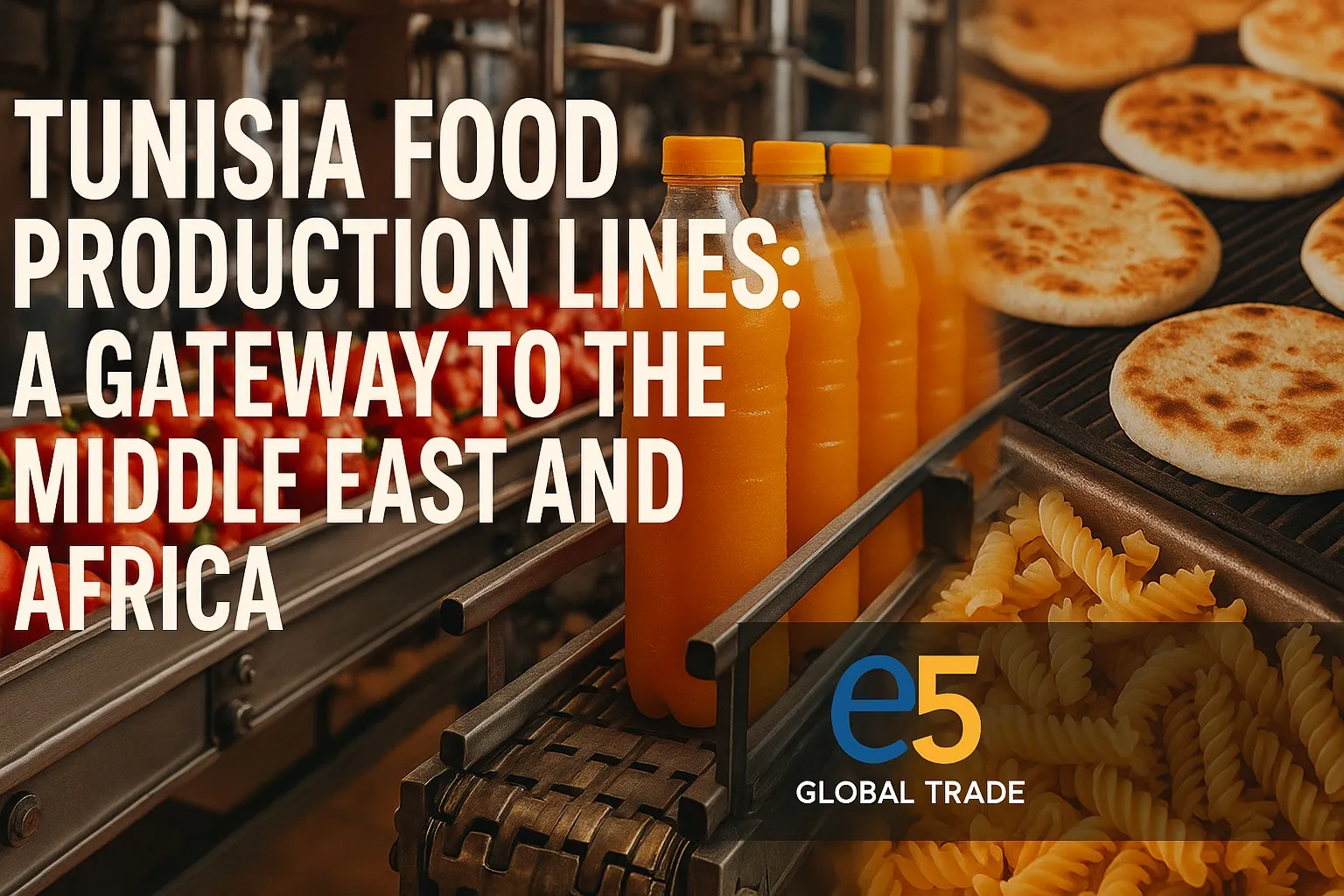Tunisia's Food Production Lines: The Gateway to the Middle East and Africa
Despite its location on the northern coast of the Mediterranean, Tunisia has become a regional leader not only in tourism and agriculture but also in modern, high-quality, and affordable food production. Particularly in the last decade, the country's food processing and packaging sector has gained significant momentum; these developments have expanded export opportunities to the Middle East and Africa.
Tunisia's Strengths in the Food Sector
Rich Agricultural Resources
Tunisia boasts high-quality agricultural products such as olives (the 4th largest producer worldwide), fruits and vegetables, almonds, figs, dates, and grains. These raw materials are fed directly into local food production lines.
Production to European Standards
Large food companies in Tunisia (e.g., Sofiprotéol, Olive Group, Cevital, Sahel Agro) implement international quality standards such as the European Union's HACCP, ISO 22000, and BRCGS. This increases export confidence. Low-Cost, High-Efficiency Production Thanks to low labor costs, a strong technical education system, and state-supported industrial zones, food production lines established in Tunisia offer higher quality but less expensive products compared to China or India. Logistics Advantage Fast access to Europe via the Port of Tunis (Hammamet, Sfax, Bizerte). Bordering Montenegro, Algeria, and Libya, it is an ideal location for intra-Africa distribution. Logistics partnerships are being developed with Turkey and Egypt. Particularly noteworthy: The “dried date packaging lines” established in Tunisia are specifically designed for “wedding and Ramadan gift” products, which are popular in the Middle East. These products are in high demand, especially in Saudi Arabia and Kuwait. Keys to Exporting to the Middle East and Africa 1. Cultural and Religious CompatibilityObtaining a Halal certification is a requirement for entering the Middle Eastern market. → More than 200 food companies in Tunisia are halal certified (TÜV, SGS, Halal Trust). Increased demand during Ramadan and religious holidays is of strategic importance in export planning. 2. Government SupportsTunisia Export Center (CTE): Support for exporters in participating in trade fairs (Dubai, Riyadh, Lagos, Abu Dhabi). 50% discount on logistics and insurance costs. Production line financing for small producers through the “Tunisian Food Export Program.” 3. Regional Trade Agreements: African Continental Free Trade Area (AfCFTA): Tunisia has access to free trade in 54 countries. Customs duties have been abolished between the Arab Trade Community (AGCC) and countries such as Saudi Arabia, Kuwait, and Qatar. Europe-Tunisia Partnership Agreement: Compliance with European standards is a confidence factor for buyers in the Middle East. 4. Logistics and Distribution NetworksThe Tunisia-Libya-Sudan road networks are active. Container shipments from the Port of Sfax to Africa are 3-4 times a week. It is engaged in joint projects with Turkish and Chinese logistics companies. Strategic Recommendations for Food Production Line Exports from TunisiaMarketing the products as “Halal + Premium + Local” → The message of “Natural, chemical-free, European quality food from Tunisia” is strong. Providing complete solutionsInstead of just selling machines:Production line installationPersonnel trainingQuality control system supportFirst 3 months maintenance warranty→ Sales rates increase by 70%. Being active in fairsGulf Food (Dubai)AfricFood (Lagos)SIAL Africa (Casablanca)Saudi Food & Beverage Expo (Riyadh)Partnering with local distributorsTunisian producers are entering into long-term agreements with local distributors (mainly based in Dubai and Lagos) in the Middle East and Africa. Future Perspective: 2030 GoalsTunisia aims to increase its food exports fivefold by 2030. Investments in food technology (AI quality control, automated packaging, blockchain tracking) are increasing. An industrial park called “Tunisia Food Valley” is planned—both production and R&D will take place there. CONCLUSION:Tunisia has become not just a “food producer” but a “complete solutions food technology exporter.” To meet the rapidly growing population, urbanization, and dietary changes in the Middle East and Africa, Tunisia’s modern, reliable, and affordable food production lines offer a key opportunity.
E5 Global Trade | Yazılar
Tunisia Food Production Lines: The Gateway to the Middle East and Africa
Küresel Haber Ajansı
·


